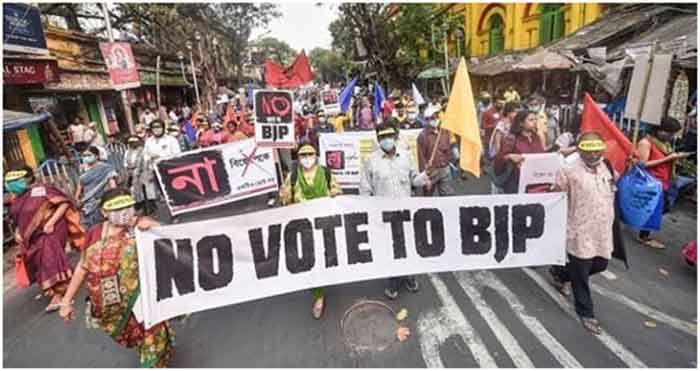
‘A Library is a thought in cold storage’
This adage by Herbert Samuel ( British Statesman 1870-1963) sounds prophetic but as of now it is not going to have any impact on the fate of a 161 year old public library in the National Capital which is suddenly facing dark days.
The genesis of the problems faced by the library, which is named after the legendary freedom fighter and scholar Lala Hardayal ( 1884- 1939) – which has a unique collection of more than 170000 books in Hindi, English, Urdu, Arabic, Persian and Sanskrit. ..one of the few Libraries in the world with a collection of at least 8000 rare books ((https://amritmahotsav.nic.in/district-reopsitory-detail.htm?2771)) – has its roots in the bickering among people who are supposed to manage the institution. What one learns that the intransigence shown by someone owning allegiance to Hindutva Supremacist viewpoint has precipitated this unforeseen situation (https://www.telegraphindia.com/opinion/should-i-have-made-your-wife-cm-instead-of-rabri-lalu-yadavs-jab-at-nityanand-rai/cid/1980987)
May be as you read these lines, wiser sense might have prevailed there and the library might be slowly limping back to normalcy.
2.
Recent developments at the library of the Centre for Historical Studies, JNU – noted for its collection of books and monographs and even personal collections from great historians of our times – including the legendary D D Kosambi etc, seem qualitatively no different.
News came in August 2023 that the library would be shifted as the University is planning to open ‘Centre for Tamil Studies’ in the very building from where the library was functioning.
Contrary to JNU’s longstanding tradition of involving students, teachers in the decision making the University had rather unilaterally taken this decision.
The EXIM library where it planned to shift the CHS library was already not a very big place and it faced space crunch. Any addition to its stock or its ceding space would have meant the rare monographs and important books in the CHS library would be damaged further.
Thanks to the resistance put up by students , teachers etc the library has not yet been shifted.
3.
May it be the case of CHS library or the historic Lala Hardayal library, what one discovers that since last around a decade, libraries especially public libraries in this part of South Asia are facing unprecedented challenges because of the priorities , concerns of the ruling dispensation at the centre.
The proposed bill to bring public libraries under concurrent list of the constitution which can facilitate easy intervention of Central government in its functioning (https://thesouthfirst.com/karnataka/union-government-looks-to-move-libraries-from-state-to-concurrent-list-kerala-karnataka-flag-concerns/) can further add to their problems.
Till date public libraries are a state subject, meaning states have control over them, if the bill is passed then we will have a situation “where the Union government and states will have equal jurisdiction.” (-do-)
What is rather problematic that the ruling dispensation at the centre wants to move this proposal in rather insidious ways which will facilitate Union government’s intervention on public libraries in India.
4.
Public Libraries – No more gatekeeping knowledge !
Question arises what must have prompted the Union government to take up this bill which supposedly encroach upon the rights of the states and will ensure that it will have key say in running public libraries.
There could be many reasons behind it :
One, the key point is that an organisation like RSS or its affiliated organisation like BJP is concerned, stand exactly opposite the very idea for which a public library is established. The exclucivist viewpoint which they promote is an anathema to the very idea of a public library.
Anyone who is familiar with history of library ( libraries ) in India knows that the idea of a library especially a public library is in a sharp contrast to the ‘long history of gatekeeping knowledge’. There is a long history of excluding students with ‘wrong gender or wrong caste’ or from poor and downtrodden strata of society from the learning experience itself. (https://indianexpress.com/article/opinion/columns/the-right-to-read-we-need-to-reimagine-public-libraries-as-inclusive-spaces-8678445/)
Two, a cursory glance at the history of public libraries makes it clear that such entities, institutions which came up and were built during the historic anti-colonial struggle against the Britishers – not only helped spread literature and all sorts of books to remonte corners of the country but also became a place for discussion and debate when other avenues were not available there.
One can recall how Dwarakadas Library in Lahore, in prepartition days, literally facilitated rise of many revolutionaries. right from Bhagat Singh, Sukhdev, Bhagwati Charn Vohr to Yash Pal (https://thewire.in/history/bhagat-singh-dwarka-das-library-lahore-chandigarh)
Three, fact is that the growth of public libraries in India is not even. The Southern states of India – which have witnessed public library movement since days of colonialism lead the list.
Remember also that barring the Union Territory of Goa, the ruling dispensation the centre or the party to which it lays its adherence never have had any solid base in this region making it evident that perhaps well read, well-educated citizenry which is ready to appreciate new ideas can never be influenced by such an exclucivist ideology like Hindutva for a long time.
Four, the move to reining in public libraries is basically an attempt to make a dent in these regions with a long term planning.
As far as the functioning of these public libraries is concerned, it is not difficult to imagine how it will unfold and what disastrous impact it can create on their functioning.
Right from allotment of funds for the libraries to the purchase of literature, other books for the library, everything will be under the scrutiny of the Union government and looking at its core concerns – about ushering in a Hindu Supremcist wonderland still intact – it can play havoc with their core functions.
What Kerala Higher Education Minister R Bindu underlined few months back is worth remembering, “[t]he move was aimed at usurping control of knowledge dissemination and spreading regressive ideas.”(-do-) Similar concerns were expressed by V K Madhu, Secretary of the Kerala Library Council
“If such a law is enacted, we will be compelled to buy books spreading Sangh Parivar’s ideology,” “Books on scientific thought and rational thinking would be removed from the priority list. Regressive books would replace them, and the future generations would suffer”
5.
Learning from the Nazi Playbook ?
The feverish attempts to convert public libraries into a playground of Centre’s whims and fancies reminds one of how Trump’s America witnessed banning of books and censoring of articles on a mass scale (https://mastersfdl.hypotheses.org/3459) which could be rescinded only after arrival of Biden but the spillover still continues ( -do-)
The project to control public libraries in India – which is unfolding before us – reminds one of the way Nazi’s undertook this task
Margaret F. Stieg’s book ‘Public Libraries in Nazi Germany’ [By Margaret F. Stieg , Tuscaloosa: University of Alabama Press. 1992 ] throws light on the key features of the project Nazi took up in Germany.
According to her studies show that the ‘public library’ was in fact ‘central to the dissemination and knowledge’ in their schemata of things. “In its fully developed form the Nazi public library defines the political public library”(https://digitalcommons.unl.edu/cgi/viewcontent.cgi?referer=&httpsredir=1&article=1079&context=historyfacpub)
The “Library Development Program,” attempted to bring the peculiar Nazi mix of Bildung and ideological indoctrination even to the most remote corners of Germany.
The task to transform library collections went through ‘a dual process of purging and collection development.’ The major purge took place in 1935. In the case of several big-city libraries, where collection develoment had in the past catered to the political sensibilities of the working class, the extent of the purge was massive.
Much can be written about the Nazi experiment in shaping public libraries in Germany.
6.
Today, there is a conscious attempt to rewrite and legitimise a narrative which suits them, when time n again even the Prime Minister has no qualms in peddling a lie about ‘India’s thousand year old slavery’ what use such libraries or students n scholars gaining new insights from our very own past, have for the establishment of Hindu Rashtra. (https://thewire.in/communalism/how-the-ichr-is-inventing-history-under-the-modi-government)
As far as they are concerned the need to reshape and redesign public libraries has never been greater
The present day proponents and peddlers of Hindutva would not like to remember today that Hindutva ideologues -their intellectual forefathers – have had no qualms in singing paens to their exclucivist worldview and the ethnic cleansing of sorts – the ‘final solution’ they offered. In fact they must have resolved long back that in future they would similarly pursue the idea and project to control public mind and can take up the task of reining in public libraries at an opportune time and shaping them in their own imagination.
Subhash Gatade is a left activist associated with New Socialist Initiative
















































